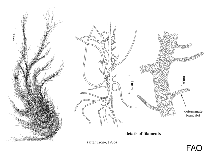Ulva intestinalis Linnaeus
Hollow green nori| Native range | All suitable habitat | Point map | Year 2050 |

|
| This map was computer-generated and has not yet been reviewed. |
| Ulva intestinalis AquaMaps Data sources: GBIF OBIS |
Google image | No image available for this species;
drawing shows typical species in Ulvaceae.
Classification / Names Common names | Synonyms | CoL | ITIS | WoRMS
Ulvophyceae | Ulvales | Ulvaceae
Environment: milieu / climate zone / depth range / distribution range Ecology
Sessile; depth range 0 - 20 m (Ref. 101733). Subtropical
Distribution Countries | FAO areas | Ecosystems | Occurrences | Introductions
Arctic, Indo-Pacific, Atlantic Ocean, Mediterranean and Black Sea. Subtropical to polar.
Length at first maturity / Size / Weight / Age
Maturity: Lm ? range ? - ? cm Max length : 20.0 cm H male/unsexed; (Ref. 80758)
Short description Morphology
Life cycle and mating behavior Maturity | Reproduction | Spawning | Eggs | Fecundity | Larvae
Main reference
References | Coordinator | Collaborators
Guiry, M.D. and G.M. Guiry 2009 AlgaeBase. World-wide electronic publication, National University of Ireland, Galway. http://www.algaebase.org; searched on 14 April 2009. (Ref. 80701)
IUCN Red List Status
(Ref. 130435: Version 2025-1)
CITES status (Ref. 108899)
CMS (Ref. 116361)
Threat to humans
Human uses
Fisheries: commercial; aquaculture: commercial
| FishSource |
Tools
More information
Diet composition
Food consumption
Predators
Max. ages / sizes
Length-weight rel.
Length-length rel.
Length-frequencies
Mass conversion
Abundance
Maturity
Fecundity
Spawning
Eggs
Egg development
Larvae
Internet sources
BHL | BOLD Systems | CISTI | DiscoverLife | FAO(Publication : search) | Fishipedia | GenBank (genome, nucleotide) | GloBI | Gomexsi | Google Books | Google Scholar | Google | PubMed | AlgaeBase | Tree of Life | Wikipedia (Go, Search) | Zoological Record



